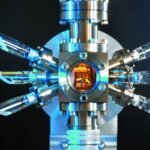 Last night, I saw a lecture at the Royal Institution.
Last night, I saw a lecture at the Royal Institution.
It was all about time – a subject that has always fascinated me.
Called “Fragile Times: Why Accurate And Resilient Timekeeping Is Critical”, I found it amusing – and, of course, somewhat ironic – that it started two and a half minutes late.
But it was enjoyable, nonetheless.
Several speakers from the National Physics Laboratory, gave talks covering their particualr fields of expertise: starting off with a bit of history, then some examples of areas where accurate timekeeping is essential; onto the current range of atomic clocks, using caesium fountains and hydrogen masers and finally onto the latest devices which are under development: optical clocks.
With an uncertainty of just a couple of parts in 1018 these latest timepieces are 100 times more accurate than the best atomic clocks we have today.
To give an example of the level of accuracy they hope to achieve, one of the speakers said that it would be like calculating the age of the universe (circa 14 billion years)… to within half a second.
Boom! Mind blown.
Yes, yes. But what’s the time?
(those numbers are absolutely mindblowingly amazing)
It’s 05:39
Just use your own “optical” organs to look at a time piece. Much simpler.
Which is fine… if you know that timepiece is accurate.
05:42
Does that mean my current watch is rubbish?
Yes. Watches made from dried fruit have never been particularly good.